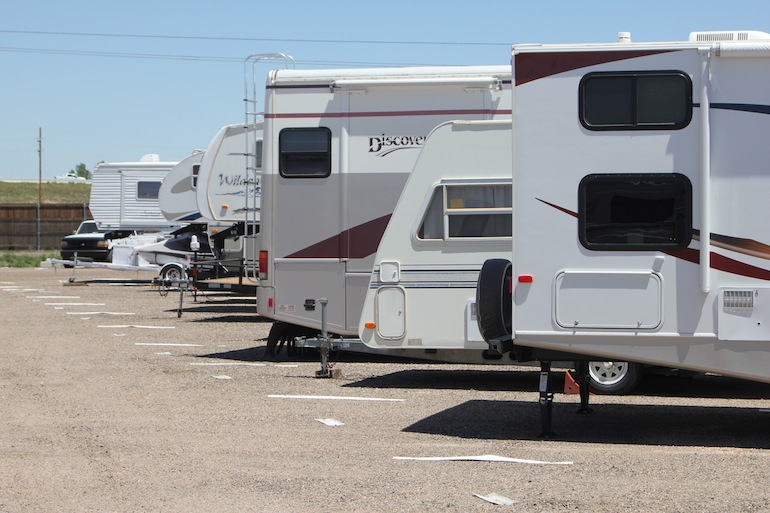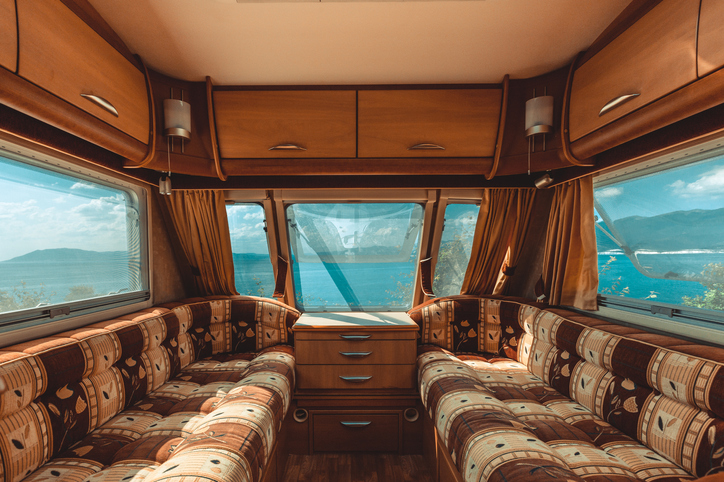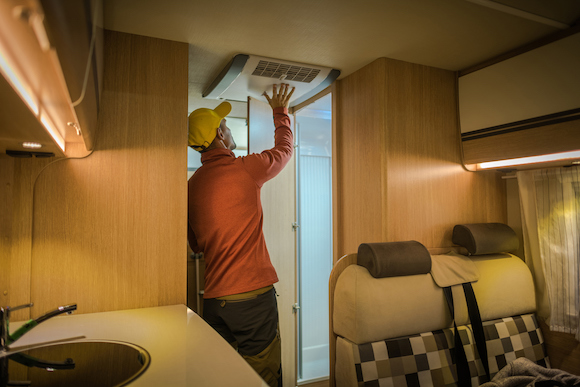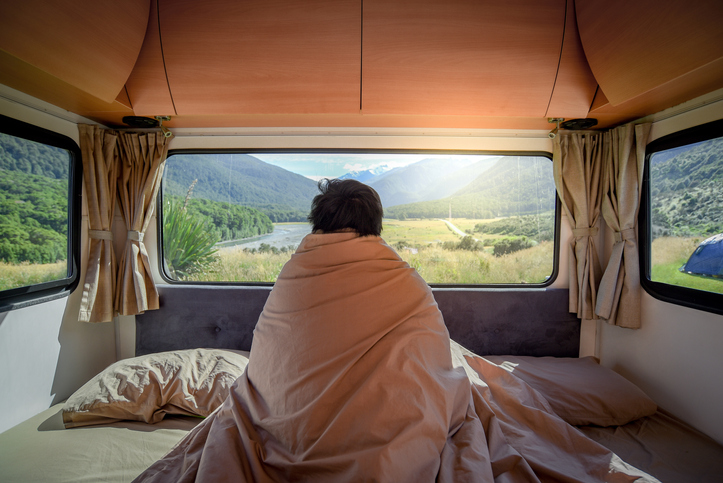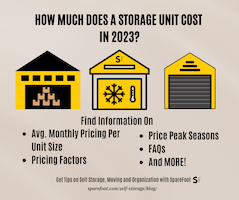Have you ever passed an RV with a smiling driver and thought, “One day, that’ll be me?” If so, you’re not the only one itching to hit the road in a Winnebago.
In a recent SpareFoot survey on leisure vehicles, 42% of respondents said they’d buy an RV or mobile camper if money were no object. However, there’s a lot more to owning an recreational vehicle than whizzing down the highway and hanging out at campgrounds. If you’re a first-time RV buyer, the process can seem insurmountably overwhelming.
But worry not future RVers. Here’s what you need to know before jumping into the RV buying process so you can navigate the journey like a seasoned road warrior.
Take Your Time
Smart buyers research for a year or more before buying an RV, says Chuck Woodbury, editor at RV Travel, an RV news and information website. An RV can be the most expensive item you’ll ever purchase after your home, he says.
Inexperienced buyers purchase an RV based on appearance and floor plan alone, without taking time to notice cheap components like an off-brand water pump, substandard plumbing or cabinets stapled to the walls, says Woodbury.
“Whatever you do, never buy on impulse,” he says.
Narrow Down Your Choices
Do lots of research first, then narrow down your options. The world of recreational vehicles is immense and includes motorhomes, travel trailers, teardrop trailers, pop-up campers, and fifth wheels. All of these different types of RVs have different features and price points. Knowing what you want from an RVing experience and what you can afford up front will help you narrow down your options.
- Class A Motorhomes: Resembles a bus or semi-truck. Range in length between 21′ and 45′. Prices start around $50,000-$150,000 up to $500,000-$800,000 for luxury RVs.
- Class B Motorhomes: These are camper van conversions, with a bubble roof to allow standing room inside of the living space. Prices start between $40,000 and $80,000 with luxury models fetching up to $125,000. Sizes generally range between 15′ and 26′
- Class C Motorhomes: Class C motorhomes are essential scaled-down versions of Class A motorhomes, maxing out at about 36′. The price tag for a new Class C motorhome starts between $50,000 and $80,000.
- Travel Trailer: Travel trailers are non-motorized recreational vehicles that must be towed by another vehicle. Standard travel trailers cost around $35,000.
- Fifth Wheel: A fifth wheel is a type of travel trailer that is more stable when towed. It also usually features an over the cab living space. Cost for this type ranges between $25,000 and $100,000.
- Lightweight trailer: Including pop up campers and teardrop trailers, lightweight trailers typically sleep two to four people. Their main advantage is that they can be towed by smaller vehicles. Cost for new lightweight trailers range typically between $5,000 and up to $15,000.
One big decision you will have to make is whether you want to buy a brand new RV or a used RV. Remember a new RV depreciates immediately after you leave the dealership. A used RV that is a few years old will typically cost 20% to 30% less than it cost brand new.
Tap Into the RV Community
Search online for RV forums, clubs for specific RV brands, local meetup groups and YouTube videos for advice and tips from other RV owners.
“There’s no better way to find out what it’s like to own an RV than to talk to someone who owns one,” says Woodbury.
Check out local RV shows, where you can get a look inside of many different RV models at once. These events are great to attend if you are conducting research prior to buying your first RV. One perk of going to an RV show is there is less sales pressure than you might encounter if you visit an RV dealer. RV shows are a good chance to get your feet wet if you are first time buyer.
Negotiate the MSRP
When buying a new RV, start with an offer 30 percent off MSRP, says Woodbury.
“If you can’t get the deal or close to it, don’t buy. Walk away. Or try a different dealer,” Woodbury says.
Best times to buy a new RV: Last of the month or end of the year when sales departments need to meet quotas.
Even New RVs Can Arrive With Problems
The RV industry’s push for productivity can cause mistakes and production shortcuts, says Woodbury.
“RVs are often shipped to dealers without a final inspection,” he says. “And even if they are inspected, dealers are expected to fix what is wrong before selling them, which some do and some don’t.”
New coaches can also have “lot rot,” water damage from going unchecked for sealant leaks for months on dealer lots, according to James West, owner of The Kilted Tech RV Repair.
“We recommend purchasing a $50-$90 moisture meter and checking the interior,” says West.
Anything registering over 20 percent on the meter is wet and should be repaired.
Before buying make sure you are covered under a warranty. Typically new RVs will have a manufacturer warranty, as well as an optional extended warranty that you can purchase from the dealer. Familiarize with what these cover. Given the high cost of RV repairs, you’ll likely want some level of warranty coverage to make sure you are protected in case there are any issues with your RV purchase.
Consider Buying Used
RVs are “a luxury that depreciates fast,” says Woodbury.
An RV loses at least 25 percent of its value the minute you drive it off the lot. Woodbury recommends buying an RV that’s a few years old from an owner with records showing the vehicle was well maintained.
“You can often buy an RV for half what it costs new, looking like new, with all the bugs worked out,” he says.
Check with RV dealers to see what inventory they have.
Rent an RV First
Another option may be to look for an RV rental for your first big road trip. This will give you a feel for everything involved with RV ownership without making the investment. Taking a rental for your first major RV trip can give you an idea of features you like or dislike, and help you choose the perfect RV when you are ready to buy your own. If you are questioning whether buying a new RV is worth it, renting an RV for a trip a on the open road will help you decide if the RV lifestyle is for you.
Repairs are Expensive and Mechanics Hard to Find
“There is a great shortage of RV repair shops, says Laura Nunemaker, an RV “full-timer” who lives and works remotely with her husband Kevin in their 2003 Winnebago Adventurer. “If you need work done, plan ahead. Most shops are booking at least two to four weeks out.”
- Water leaks are one of the most expensive RV repairs.
- A front-wall rebuild, which involves removing and replacing wet wood and insulation, runs around $3,000.
- Roof replacements cost anywhere from $4,000 to $7,000.
- Keep in mind that many RV dealerships won’t service or repair your RV unless you bought it from them.
- You may also have trouble finding certain parts for RVs over ten years old.
Annual Maintenance is Costly
Most RVs can last up to 15 years if general maintenance is performed, says West. You’ll need to set aside at least a couple thousand dollars for annual RV maintenance and repairs. A sealant inspection of moldings, windows, doors and hatches is crucial every spring and fall.
Other maintenance costs include brakes, bearings, bushings, sealant work, a propane gas test and general wear and tear repairs. Tires are pricey. Six tires for a 32-foot Winnebago can run $500 apiece.
RVs are Gas Guzzlers
Gas mileage varies substantially, depending on vehicle weight and whether the RV uses gasoline or diesel fuel, says David Rich, author of RV the World.
“While gas mileage for almost any size RV varies between four and ten miles per gallon, a diesel RV will get up to 20 MPG,” Rich said.
Good Camping Can Be Hard to Find
The bigger your RV, the more limited your camping options at state and national parks. Many parks have a limited number of spots that can take larger RVs, and they book up fast, says Nunemaker.
However, a large community has grown around boondocking, which is vehicle camping in remote off-grid areas. Many folks live in RVs full-time. If you know where to look and how to prepare, there are plenty of places to park your rig.
RV Storage Matters
RV tires age prematurely when the vehicle is stored or parked in direct sunlight and subjecting your RV to the elements will speed depreciation. Besides, your homeowners association may balk if you try to park your RV in your driveway or the street, so it’s a good idea to count on storage costs for at least part of the year. You can easily find and reserve an RV storage space online for free using SpareFoot.
